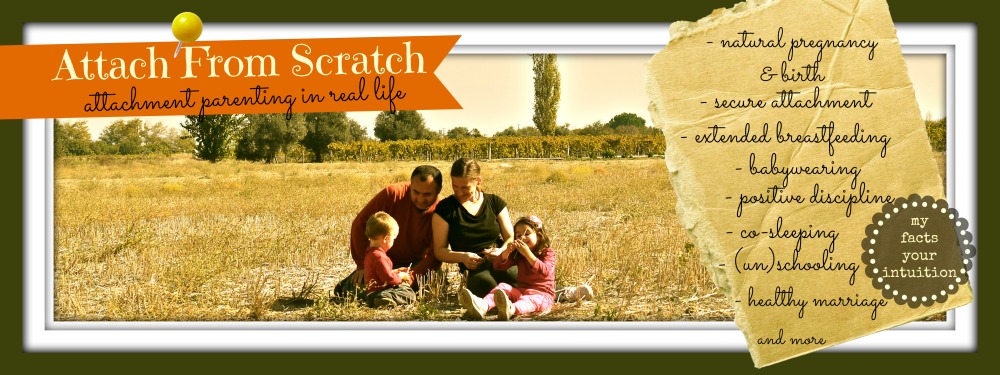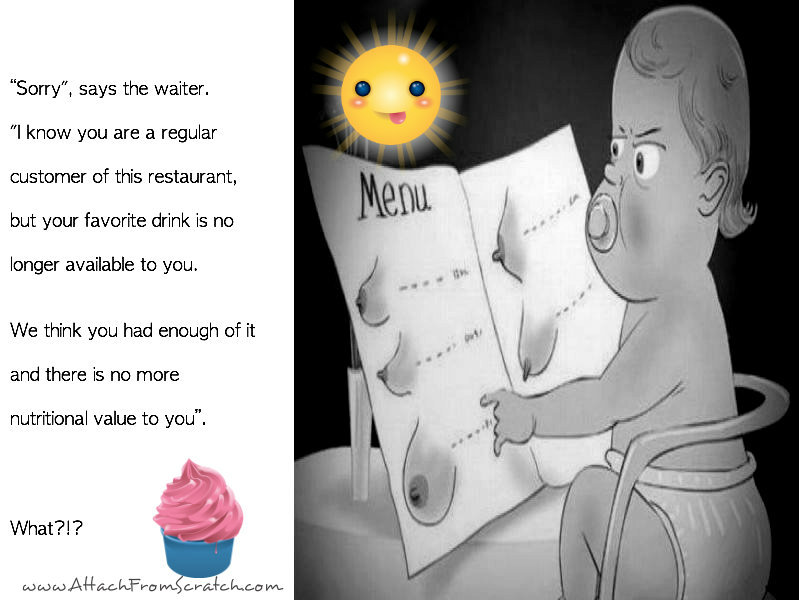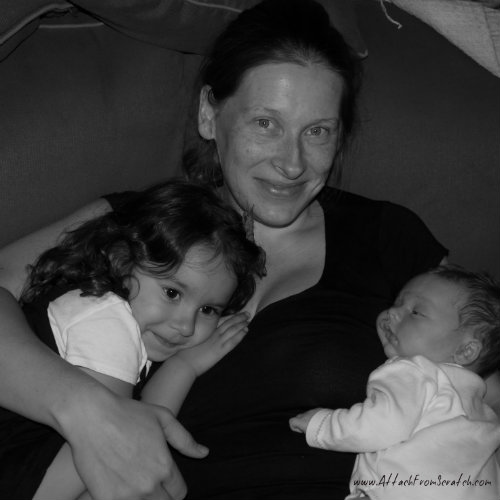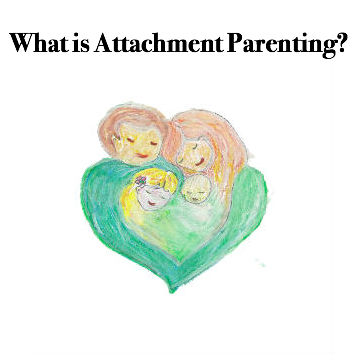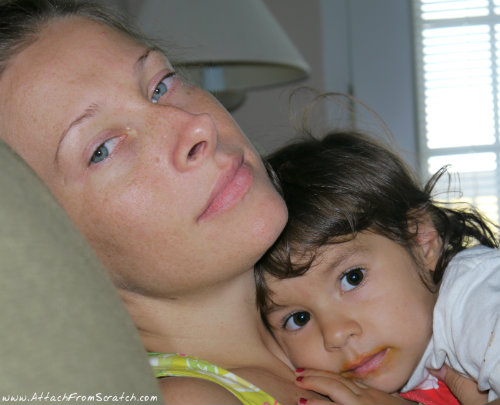Extended Breast Feeding -
Extended Benefits
Extended Breast Feeding means nursing a child beyond 1 year.
- The American Academy of Pediatrics currently recommends that “breastfeeding continue for at least 12 months, and thereafter for as long as mutually desired.”
- The World Health Organization and UNICEF recommend that babies be breastfed for AT LEAST two years.
In this article
The Advantages of Extended Nursing
By now more and more people know that breastfeeding is healthy for a child and the mother.
However, many people think breastfeeding is only for infants. Anything after - is considered “weird”, “not beneficial anymore”, etc.
Benefits of Extended breastfeeding for a child:
- As long as you breastfeed, your child’s immunity is being “charged”. That means the hormones, the cells and antibodies in mother’s breast milk keep doing their job - boost the immune system.
- Breast milk keeps changing its nutritional values according to child's age. So your 3 year old will get exactly what he needs from your milk.
- The more mother’s milk baby gets, the healthier he will be .
- The longer we breastfeed, the smarter they will be.
- Extended breastfeeding - extended time to bond - extended time to create a strong loving life-long relationship.
Without many debates let’s look into research done about the benefits of extended breast feeding.
|
STUDY |
RESULTS |
|
Fat and Energy Contents of Expressed Human Breast Milk in Prolonged Lactation |
"Human milk expressed by mothers who have been lactating for >1 year has significantly increased fat and energy contents, compared with milk expressed by women who have been lactating for shorter periods. During prolonged lactation, the fat energy contribution of breast milk to the infant diet might be significant." |
|
Nutrition, growth, and complementary feeding of the breastfed infant |
"Breast milk continues to provide substantial amounts of key nutrients well beyond the first year of life, especially protein, fat, and most vitamins." |
|
Long-Term Breastfeeding: Nourishment or Nurturance? |
"Data collected on 38 long-term breastfeeding children (12 to 43 months old) included growth measurements, breastfeeding patterns, and dietary intake obtained through diaries and dietary recalls. Although the children's weight-for-age, length/height-for-age, and weight-for-length/height Z scores clustered below zero, they fell within two standard deviations of the median, suggesting normal growth. The daily time and frequency of breastfeeding were not different between the 1-year-old and 2-year-old age groups but were significantly lower in the 3-year-old age group. In an analysis of non–breast milk diets, the children would need an average intake of 100 to 460mL of breast milk per day to meet the RDA for energy intake and nutrients that were lower in their diets compared to national food intake surveys." |
|
Breastfeeding Duration and Academic Achievement at 10 Years |
"Predominant breastfeeding for 6 months or longer was positively associated with academic achievement in children at 10 years of age. However, the effectiveness of breastfeeding differed according to gender; the benefits were only evident for boys." |
|
Breastfeeding and Child Cognitive Development New Evidence From a Large Randomized Trial |
"These results, based on the largest randomized trial ever conducted in the area of human lactation, provide strong evidence that prolonged and exclusive breastfeeding improves children's cognitive development." |
|
Breastfeeding and Later Cognitive and Academic Outcomes |
"It is concluded that breastfeeding is associated with small but detectable increases in child cognitive ability and educational achievement. These effects are 1) pervasive, being reflected in a range of measures including standardized tests, teacher ratings, and academic outcomes in high school; and 2) relatively long-lived, extending throughout childhood into young adulthood." |
"The brain grows more during the first two years of life than any other time, nearly tripling in size from birth to two years of age. It's clearly a crucial time for brain development, and the intellectual advantage breastfed babies enjoy is attributed to the "smart fats" unique to mom's breast milk (namely, omega-3 fatty acid, also known as DHA)."
Benefits of extended nursing for a mother:
- the longer women breastfeeds, the bigger chances to reduce the risk of breast cancer, ovarian cancer, rheumatoid arthritis, high blood pressure, heart disease and diabetes.
- breastfeeding
a toddler means you can calm his tantrum down my simply offering a
breast. It is a great relaxing tool through some tough days for a mother
and a child.
Find more benefits of breastfeeding for mother here.
Disadvantages of extended breast feeding
Are there any?
As
nothing can be perfect in life, there are some minor disadvantages of
extended breast feeding. In fact, they are basically invisible to me and
do not bother me at all.
- There is a big difference between breastfeeding a newborn and a toddler. Therefore, a mother needs to adjust to child’s growth and development. It can be a toddler who just got his teeth and needs time how to learn nursing without biting or an active and very busy toddler who needs to change at least 50 positions throughout breastfeeding session.
- The longer you breastfeed the more judgmental looks and comments you will get. It is not as widely accepted in our society to breastfeed a toddler. With so much of social disapproval it can get frustrating every time you want to breastfeed your toddler in public.
- It is not that easy to find a pediatrician who would be a big supporter of extended breastfeeding as you might think. It is quite upsetting when your doctor tells you that you should not breastfeed your child anymore.
- Some
people believe that weaning a toddler is much harder than weaning a one
year old. But personally to me it does not make any logical sense. I
would rather enjoy all the benefits of breastfeeding for another 1-3
years and take the risk of having “hard time” weaning my child then not
breastfeeding my child after 1 year at all.
- Extended breastfeeding means no week-long vacations with your spouse, no long night-outs with your friends since your toddler can’t be left without his food for a long time.
- Not using an alcohol while breastfeeding can be a challenge for some women on those days when they crave for some cold glass of white vine.
The criticism of extended breast feeding
How to handle it
Surprisingly, one of the biggest obstacles a mother, who breastfeeds her children past 1 year, has to overcome - is Criticism.
Of course after some time we build up some tough skin and know better how to respond to it, but beginning might be challenging.
So toughen up with these ideas below and get on breastfeeding!
“You are still nursing?”
“Are you trying to cut down?”
“When are you weaning him off?”
“Don’t you think he is too old for breastfeeding?”
“There are no real benefits of breastfeeding after 6 months.”
Here are some great tips about how to handle unwanted advice, criticism, replicas about extended breast feeding:
1.
Best way to “silence” your opponents is to tell them about the benefits
of extended breastfeeding based on many research. Keep in mind that
those benefits are not only to a baby, but to a mother too. It’s the
science after all. Not many can argue against that.
2. Remind them that The World Health Organization (WHO) recommends mothers breastfeed until 2 years of age. American Academy of Pediatrics recommends breastfeeding “at least until one year of age and then as long as baby and mother mutually want to”.
3. After trying the science, the health organization recommendations, try the doctor pitch.
“Our pediatrician has recommended to continue breastfeeding because of its many benefits”.
This should close the deal most of the time.
4. Use humor. If you know that this person won’t be bothering you more, you can easily slip a joke into awkward situation. “I make sure I quit breastfeeding him before he gets off to college”.
5. Ignore the whole subject of breastfeeding. If it comes up - change the topics.
6. Be honest. If the person is a close friend or family and his judgmental comments are hurting your feelings - let him know. Find out the real reason why is breastfeeding bothering him and then try to address this issue by explaining your position in this situation. Some people just simply haven’t had a chance to do research.
7. Last. But not the least. Thanks to breastfeeding, children have better health, easier sick days, higher IQ scores and better relationship with others. Your child IS a walking proof of extended breast feeding advantages. No words needed. He is great in every aspect. Sooner or later this will come to the people who had criticized you.
Extended breast feeding statistics
U.S. National Breastfeeding Rates, 2009 Child Age Breastfeeding
Child Age Breastfeeding %
At Birth 76.9
7 days 76.1
14 days 75.3
21 days 73.5
28 days 72.5
42 days 68.4
1 month 72.0
2 month 66.5
3 month 61.3
4 month 54.2
5 month
50.0
6 month 47.2
9 month 33.7
12 month 25.5
18 month
9.0 Source
Common myths
about extended breast feeding
|
Myths |
Facts |
|
Mother’s milk is less nutritious after the first year. |
Actually Breast milk still makes and provides enough nutrients to the child after 1 year. |
|
The immunities in mother’s milk are lower after the first few months |
In fact those immunities are in mother’s milk as long as child breastfeeds. research has proved that kids who breastfeed longer have less illnesses and shorter and easier sick days when they do get an illness. |
|
Child who is breastfed beyond 1 year of age can be independent and can even have some psychological harm. |
Actually, it is opposite. According to Attachment Theory, when child’s needs are met whether is sleeping, crying or feeding the child feels confident later in life to explore and be more independent. |
“There is no upper limit to the duration of breastfeeding and no evidence of psychological or developmental harm from breastfeeding into the third year of life or longer.”
Natural age of weaning in children is between 2 and 7 years. “There is no evidence that extended breastfeeding is harmful to mother or child.”
American Academy of Pediatrics
|
Mother who breastfeed toddlers are only doing for themselves. |
Have you tried forcing a child to breastfeed? No child will continue to nurse if he doesn’t want it. Mothers breastfeed because of the benefits that continue throughout the nursing period. |
|
Mothers who breastfeed have to stop nursing if/when they get pregnant. Breastfeeding during pregnancy can be dangerous. |
You can/will get pregnant while breastfeeding. Breastfeeding while pregnant is completely safe and healthy. |
|
It is harder to wean a toddler. |
It depends on a child as everybody is different. |
How long should we breastfeed?
Every time I hear this question, another one ‘pops’ in my head: How long should we feed vegetables to our kids?
We can follow the recommendations of health organizations, our pediatricians, our mothers, aunts and total strangers. But no one will know better than you and your baby.
When making a decision about how long you should breastfeed keep in mind:
- your bodily health
- the child’s actual physical health, especially his immune system
- your pressure level
- your child’s psychological needs
- your emotional needs
- the amount of support from spouse, close family and friends.
Find out natural weaning time for children here.
When To Stop Breastfeeding
is not only up to a mother
|
|
Extended breast feeding and work
Is it possible?
There are a lot of mothers who work full time and still mange to breastfeed their toddlers.
How do they do it? Which super powers do they use?
It is not easy.
There are few ways to do it.
- pump
- breast feed at home as much as possible.
or
- do not pump
- breast feed at home as much as possible
More about expressing breast milk - here.
Best positions
for extended breast feeding
As toddlers are very active it can get hard to get them to latch and actually nurse for a certain period of time.
Be creative and very open minded when searching for a perfect breastfeeding position with your toddler.
Here are some great tips and video tutorials about breastfeeding positions (including toddlers).
Breastfeeding Positions
To make Breastfeeding Enjoyable
Teeth and extended breastfeeding
There is one more myth less about breastfeeding damaging kids teeth and causing caries.
The study “Association Between Infant Breastfeeding and Early Childhood Caries in the United States” found no tie between dental caries and breastfeeding, including prolonged breastfeeding.
This study collected data from the 1999-2002 National Health and Nutrition
Examination Survey for children aged 2-5. Several factors were
considered, including oral health and infant feeding.
Tandem breast feeding
Tandem nursing is breastfeeding more than 1 child at a time. A lot of women who breastfeed their children past 1 year start tandem breastfeeding too because of a new pregnancy and a new baby.
Some toddlers however tend to wean due to the change of taste of milk and lower supply. Some kids keep nursing and welcome their new breastfeeding buddy.
To read more about Tandem Breastfeeding, click here.
Extended Breastfeeding compliments
Attachment Parenting
Contrary
to popular belief, breastfeeding older children doesn't mean that we will make them spoiled, dependent, needy. Attachment theory states that close bond and nourishment increases confidence and ability of children to
be able to achieve independence naturally.
When kids are allowed to pace themselves, they are more secure in their independence than children who are forced into separation before they are emotionally ready.
"Meeting a child's dependency needs is the key to helping that child achieve independence. And children outgrow these needs according to their own unique timetable."
Elizabeth
N. Baldwin
Share your story and experiences to other mothers about extended breast feeding.
Like This Page?
|
|
Let Google know about it |
